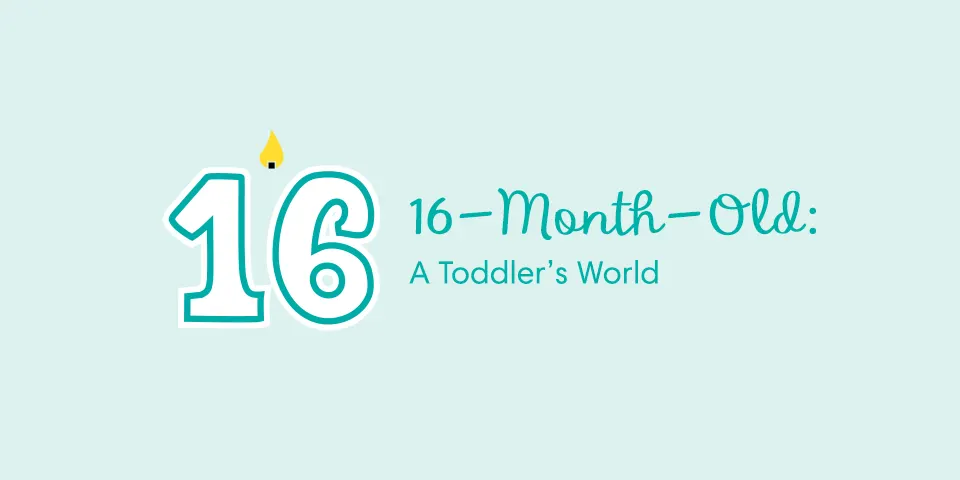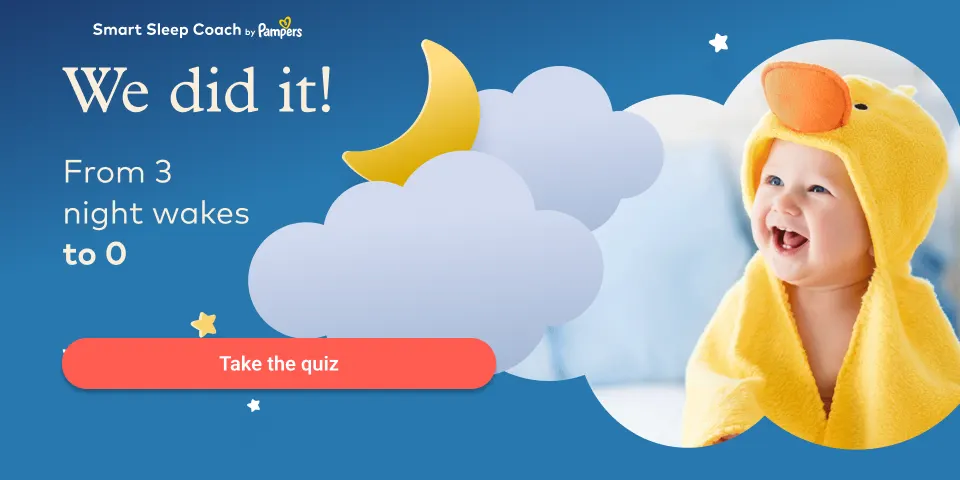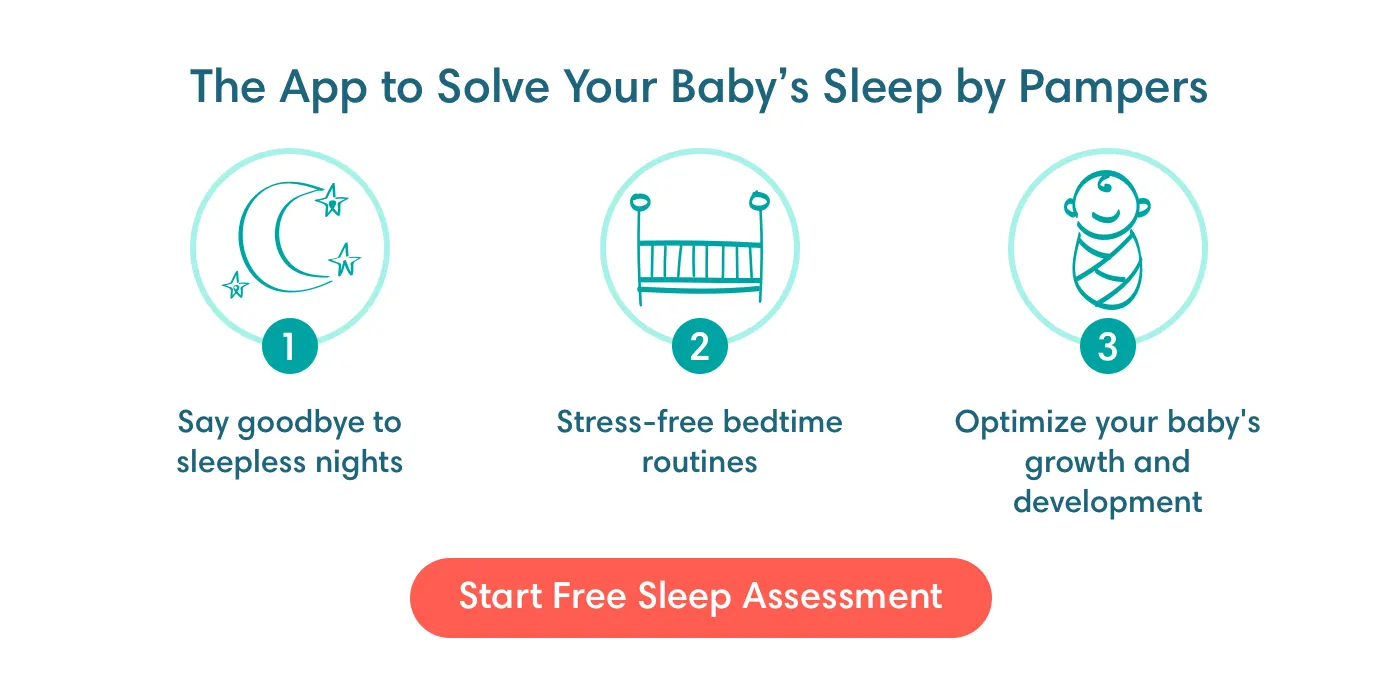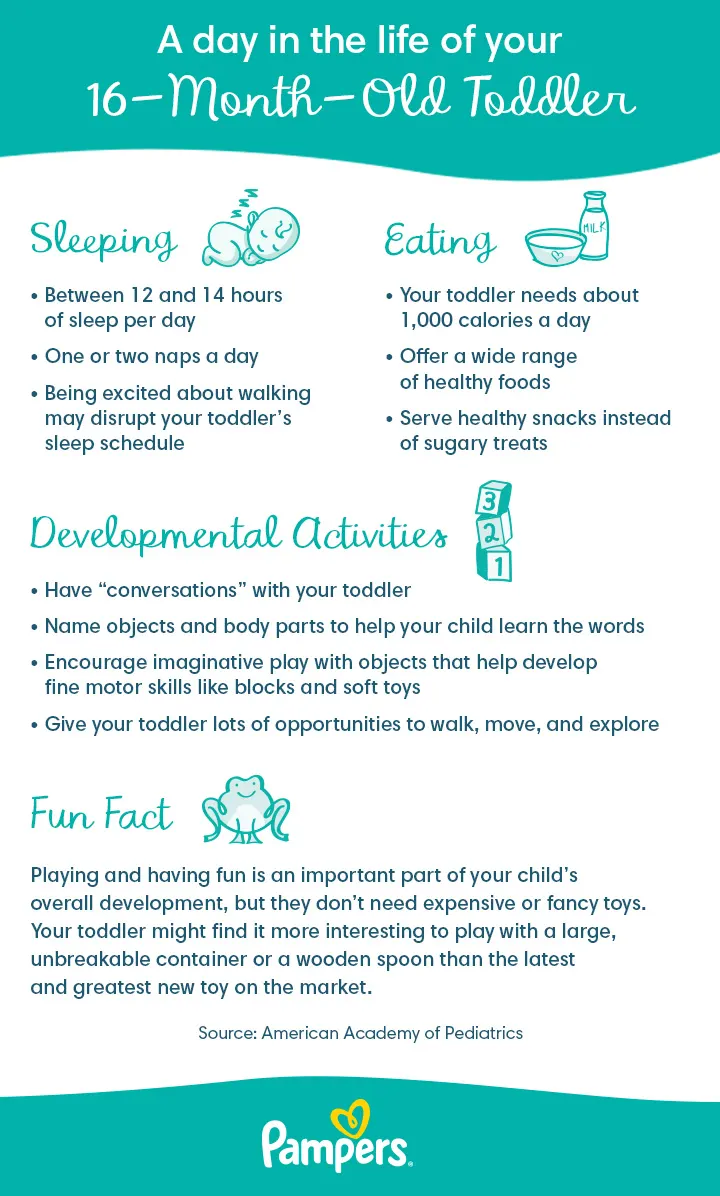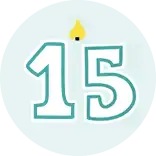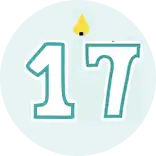16-Month-Old: Developing Social Skills
At 16 months old, your toddler will exhibit quite a few developmental milestones, especially within their personality. Your little one’s world revolves around them, so you may witness a new sense of neediness, separation anxiety, or difficulty sharing. Luckily, this behaviour is completely normal and there are a few things you can do to help support your 16-month-old during this time. Keep reading to learn more about your toddler’s development and what else might be in store this month.
Toddler Development: 16-Month-Old Milestones
Just like all children, your little one is developing at a unique pace. Although you may see some of the developments in the list below, remember that your child may exhibit them earlier or later. Here are some common developmental milestones for a 16-month-old baby:
Becoming more sociable and “self-centered.” Even as your child develops social skills, they still probably think that the world revolves around them. Although this could come off as self-centered behaviour, at 16 months old, children aren’t able to understand that others may have different feelings and thoughts, nor do they know how to express their emotions calmly. When other children are around, for example, your child may take their toys but be very possessive of their own. When problems arise, aggressive behaviour is common, and your 16-month-old might hit or bite when upset. To minimize these incidents during toddler playdates, try to offer plenty of toys, and hide any of the favorite toys that may inspire a battle. Be prepared to act as the referee when needed, but rest assured that this type of behaviour won’t last forever. It’s a natural part of your toddler’s development and a common milestone at 16 months old.
Experiencing separation anxiety. It may be difficult for your little 16-month-old baby to be separated from you, especially when feeling tired, ill, or scared. At this age, children tend to fuss or cry when their parents aren’t around, such as when at work. Or perhaps your 16-month-old has started experiencing sleep regression and is waking up calling you at night. The key is helping your child feel understand that you won’t be gone forever. Therefore, don’t try to sneak off when you leave the house or drop your child at daycare, as this may have a negative effect. Brief separations are actually a good thing, as they can help nurture independence.
Improving problem-solving skills. Problem-solving is something you may start to see when your toddler approaches play. Curious 16-month-olds want to know how things work, so they might be attracted to mechanical toys, switches, buttons, and knobs. It’s a good idea to provide a range of toys and activities that are challenging but not difficult for your 16-month-old.
How to Support Your 16-Month-Old’s Milestones
Here are a few activities for 16-month-olds you can do at home to help support their developmental milestones:
Encourage play and social interactions. At this stage of your child's development, playing with others usually means playing side by side, which is called parallel play. In time and with practice, toddlers acquire the skills to cooperate and interact during play. To get things going, organise a playdate with other children around 16 months old. In addition, take every opportunity to play with your toddler. Not only is playing with you important for your child’s development, but it offers a wonderful chance for bonding.
Provide simple toys or safe objects for play. Simple objects like toy blocks, plush teddies or dolls, and puzzles (as well as safe household objects like unbreakable containers and wooden spoons) help in the development of your toddler’s imagination, hand-eye coordination, and fine motor skills. It's fun to watch your creative 16-month-old pick up a wooden spoon and pretend it’s a magic wand or use it to stir a make-believe cake. Don't feel pressured to buy new toys—you may find that when you do, your baby’s more interested in the box it came in than the toy itself!
Develop routines. Around this time, it’s important to be consistent and predictable when it comes to your 16-month-old’s daily schedule. With a reliable structure in place, your toddler will have an easier time learning rules and expected behaviours. To accomplish this, create a daily routine and stick to it when possible. For example, keep bedtime, naptime, and mealtimes at around the same time each day. Your child will come to expect this, and it might help them develop good habits.
Play music. Playing fun or calming music for your toddler may have a positive effect on their emotional well-being. Experts believe that playing calming music can help with mood, sleep, stress, and anxiety.
Set boundaries. Your strategy for discipline for your 16-month-old may look a little different than when they were younger. You may need to establish some physical and behavioural boundaries for your toddler around this time. A 16-month-old is at the age where they want to get into everything, which may create unsafe scenarios—like pulling open drawers that could fall, opening kitchen cupboards that may store chemicals, or sticking fingers in electrical outlets. Now’s a good time to revisit baby proofing, which is an ongoing task due to these everchanging developments. Then, when you see your little one headed towards trouble, redirect their attention: play a game with them, or sit them down on your lap for story time. It’s hard to anticipate your toddler’s every next move, but it will be worth it in the long run.
Introduce rhymes. Activities for 16-month-old babies can include rhymes. You may remember this one from your childhood: "Humpty Dumpty sat on a wall. Humpty Dumpty had a great fall." Not only are these rhymes fun to say or sing with your toddler, but they also serve as an important mental exercise. If your 16-month-old is not talking too much yet, rhymes can familiarise them with sound structures and letters. And when recited over and over, it can lead to understanding how certain sounds and letters go together—a great encouragement for language development and an early step on the road to reading!
Mealtimes and Menus for Your 16-Month-Old
For a 16-month-old, three small meals and two snacks a day are typically the norm, but you may find that your little one is hungrier some days and wants to skip a meal or a snack occasionally on others. When it comes to mealtime, offer your little one a few nutritious options with a variety of tastes and textures, and then let your toddler pick. You might be surprised to learn that over the course of a few days, they’ll eat a balanced diet that matches their activity level and metabolism.
Special Diets for 16-Month-Olds
Feeding your toddler can be challenging from time to time, and if your family adheres to a special diet, like a vegetarian or vegan one, you may need to take extra care to make sure they’re getting the nutrients they need. Your toddler's healthcare provider can help you put together a menu plan for a healthy diet that meets your growing child's requirements for calories and nutrients. There are plenty of specialised baby food recipes that cater to 16-month-olds, supplying them with the necessary vitamins and minerals. In some cases, your provider may recommend you serve fortified foods like iron-fortified cereals and grains to ensure your toddler gets all the important nutrients. In other cases, the provider may also recommend dietary supplements, so it’s best to follow any advice to ensure your toddler gets everything they need to grow and thrive.
16-Month-Old Sleep Schedule
As everyone is different, the sleep patterns of your little one may be quite different from another child. Generally, a 16-month-old baby’s sleep schedule may be anywhere from 12 to 14 hours a day, which includes one or two naps.
However, you may find that your child is resistant to going to sleep at bedtime, especially if they’ve just been enjoying some exciting activities. If your 16-month-old appears to be experiencing sleep regression, it could just be from these new developmental milestones or separation anxiety, as mentioned above. Establishing a nightly bedtime routine that helps your child wind down, such as having a bath and then reading a book, may help them settle more easily at night.
A Day in the Life of Your 16-Month-Old Toddler
Here’s what a regular day with your toddler might look like in your home:
Your Toddler’s Health and Safety: Dealing With the Common Cold
At some point, your 16-month-old will come down with a cold, especially if they’re in regular contact with other children, either at the playground or in daycare. Even though there is no medication that prevents or cures the common cold, there are things you can do at home to keep your child comfortable as they recover. Here’s how to help you 16-month-old with a cold, especially when experiencing respiratory symptoms like a stuffy or runny nose, cough, and/or fever:
Rest and hydration. Make sure your toddler gets plenty of rest and drinks lots of water or other non-sweetened liquids.
Nasal decongestion. If your child has a stuffy nose, talk to their healthcare provider about using saline nose drops or spray to offer some relief. Keep in mind that not all over-the-counter medicine is suitable for young children, so follow the provider’s advice.
Easy breathing. Use a cool-mist humidifier in your toddler’s bedroom to help soothe airways and make breathing a little easier, especially if they have a cough.
Fever watch. If your child has a fever, their healthcare provider may recommend using medicine to help bring down the temperature. Watch out for a high fever, as one over 39 degrees Celsius that lasts for more than 24 hours requires a call to the provider as soon as possible.
Your Life as a Parent: Making Comparisons
It’s natural for you to compare your 16-month-old’s milestones with a child of a similar age and wonder why your toddler may be smaller or taking a longer time to talk or walk. Try to remember that each child develops differently and at their own pace. Your baby may be ahead in one area, but behind in others and vice versa. This is all a natural part of developing into a unique person. It’s best to try not to compare your child to other children, or even to one of your older children who may have developed at a different pace. It’s also a good idea to try to block out unwanted or unsolicited advice from other parents or well-meaning strangers who may think they have all the answers. Instead, talk to your 16-month-old’s healthcare provider about any concerns you may have about developmental milestones.
FAQs AT A GLANCE
As all children reach milestones at different paces, there’s no exact expectation of what a 16-month-old “should” be able to do. During this month, however, your child may be able to do things like:
- Pick up a ball or another object that is in motion
- Take apart a toy and put it back together again
- Say a few single words
- Follow simple verbal instructions.
Because each toddler develops at a unique pace, your little one may develop these skills a little earlier or later.
Checklist for This Month
With so many 16-month-old milestones to look forward to, keep the following short checklist in mind as you help prepare for your little one’s development:
Update your medicine cabinet. Double check that your medicine cabinet is up to date with first-aid supplies and any medicines your little one may need. It’s also a good opportunity to check that your car has a well-stocked first-aid kit for when you’re out and about. As you update these things, safely dispose of any expired medicines and buy bandages and other items that may be running low. Keep in mind that some medicines need to be refrigerated, so check your fridge for any expired varieties.
Stock up on seasonal clothes. Whether it be winter or spring that’s just around the corner, your child may need bigger sizes of seasonal clothes, such as coats or shorts. Take stock of your hand-me-downs or take advantage of any end-of-season sales and buy the next size up, too.
Schedule playdates. It’s a good idea to schedule some playdates with other children of a similar age, as this may help with your toddler’s social development. You could meet up with some of the neighborhood families or those from daycare at the local playground or park.
Size up or switch the style of your toddler’s diapers. As your child becomes more mobile, wriggling and exploring the house as they discover the world around them, you might consider changing to Pampers Cruisers, which are made for active toddlers and feature a unique fit that moves with your child. Download the Pampers Club App for rewards on all your diaper purchases!
The information in this article is based on the expert advice found in trusted medical and government sources, such as the American Academy of Pediatrics and the American College of Obstetricians and Gynecologists. You can find a full list of sources used for this article below. The content on this page should not replace professional medical advice. Always consult medical professionals for full diagnosis and treatment.
16 month old baby - checklist
